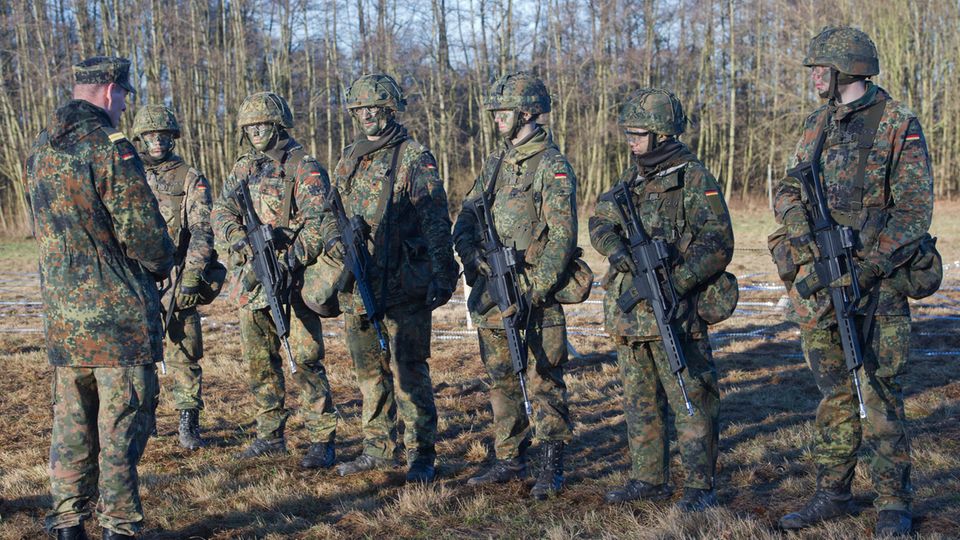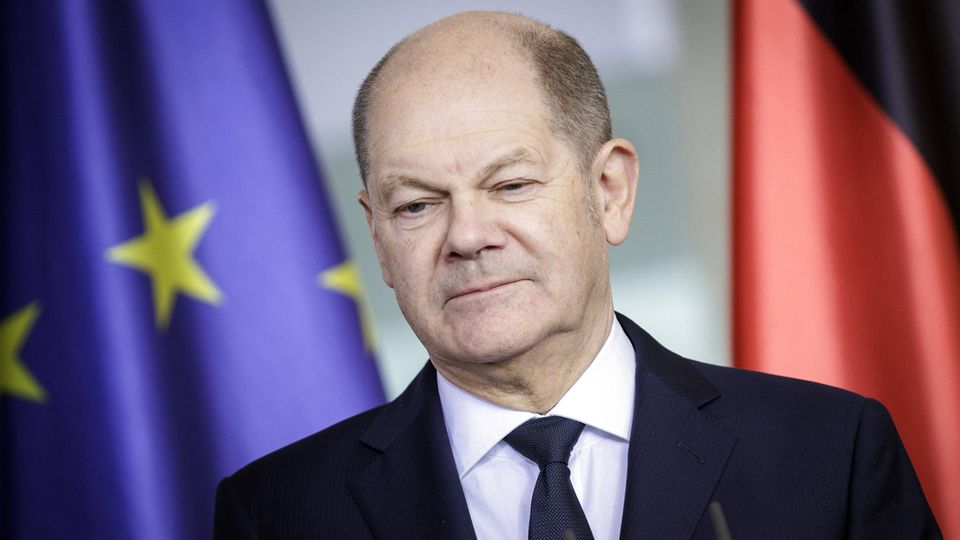On his trip to Scandinavia, Defense Minister Boris Pistorius wanted to get tips for reforming the Bundeswehr. Instead, the Swedes are suddenly asking unpleasant questions about whether Germany can still be trusted.
He actually wanted to leave the scandal in Berlin. But he just came along.
Tuesday afternoon in Karlberg Castle, the Swedish officers’ college and the oldest military academy in the world: Boris Pistorius answers questions from the press together with his Swedish colleague Pål Jonson. It’s about the successful reintroduction of compulsory military service in Sweden, about intensified military cooperation between the two countries – but also about the incident that has been troubling the Defense Minister since the weekend: the leak of a conversation with high-ranking German military officials that was intercepted by Russia, in which it is about the use of Taurus cruise missiles in Ukraine.
A Swedish journalist wants to know whether one can conclude from the conversation that Germany will send Taurus cruise missiles to Ukraine.
Boris Pistorius has come up with an explanation
“No,” Pistorius says quickly. Neither the Chancellor nor he planned this. The intercepted conversation was merely an exchange “between professional experts”. Pistorius has come up with an explanation. That everything will be clarified, but it is obviously an “individual application error”. That this is an example of how Vladimir Putin wants to divide Germany with hybrid warfare. And that there is no 100% security, but he has not noticed any anger among his foreign partners in view of the incident.
That should sound reassuring. Shit happens. Espionage happens. And Putin, the enemy of the West, is to blame.
But the Swedish press won’t let the German minister get away with it that easily. As a soon-to-be NATO partner, Sweden does have questions, a Swedish journalist adds: “Is Germany still reliable?” Pistorius has to swallow briefly before answering: “Of course Germany is still reliable.”
Things are getting out of control
He had already faced the press that morning, albeit the German press. At a time when the Defense Minister actually wanted to sit in the A400M military transporter on the way to Stockholm. Instead, he decided to appear at short notice. Because of the “dynamic situation”. That’s what they say in military jargon when potentially uncontrollable things happen.
And the situation has indeed been dynamic since the Russian propaganda station made a confidential conversation public on Friday for everyone to hear on the Internet.
At the appearance in Berlin, Pistorius seems annoyed but also determined. First, he wants to correct the impression that his senior military officials are the nation’s idiots. Men who foolishly allowed themselves to be wiretapped by Russia.
“An individual application error”
No, the problem with the intercepted conversation was not the use of the provider WebEx, says Pistorius in Berlin. But that one of the participants dialed into a hotel in Singapore via an insecure connection.
But why information is being discussed there that no longer falls into the “VS-NFD” category (classified information – for official use only), the only classification that allows the use of Webex in the Bundeswehr, remains an open question. We first have to check whether this is the case, says Pistorius.
Then he gets on the plane. This should also signal a bit of normality.
100 days in office
Boris Pistorius, the man who wants to go to Bendlerblock
In Sweden, the Defense Minister wants to find out more about the conscription model there and check whether it could be a model for Germany. The aim is to find out how the Bundeswehr can be made fit again so that it can repel an attack by the Russians or another enemy against itself or a NATO partner.
Since compulsory military service was suspended in March 2011, there has been an acute shortage of personnel in the Bundeswehr. It currently has around 181,000 soldiers and is expected to have around 200,000 men and women by 2031. But at the moment it is more at risk of shrinking.
Simply reactivating the old conscription would be difficult. Structural, legal, political. Pistorius is therefore toying with another solution, the Swedish model.
A questionnaire for all 18 year olds
The Scandinavian country abolished its compulsory military service (“Värnplikt”) in 2010, but introduced a modified model in 2017 in view of the shortage of young people. Since then, all 18-year-olds, around 100,000 per year, men and women, have received a muster notice in the form of a questionnaire that asks about fitness, criminal record and willingness to serve the country. Almost every third person is actually screened. A further selection is made from among those deemed fit for military service. Around ten percent of each age group are drafted into basic military service, which lasts between nine and 15 months.

Pistorius learned how this works in practice during a visit to the “Pliktverket” muster authority in Stockholm, one of three in the entire country. Here he learns that the new conscription is well received by the population. It is by no means voluntary, as is often communicated in Germany. However, until now it was the case that only those who had expressed their willingness were recruited from the group. This year, for the first time, young people who do not want to join the army will also be called up. Anyone who refuses to go to trial faces a penalty.
Pistorius said several times during his visit that he had “a soft spot for the Swedish model.” He doesn’t want to commit yet. It cannot be transferred one-to-one anyway. In Germany, a change to the Basic Law would be necessary. The current structures would also not be sufficient to accommodate the large number of recruits that would arise through year-by-year sampling.
After Easter, Pistorius wants to present the results of his considerations to the public and then hold a debate.
“Will not sacrifice my best officers”
But the wiretapping scandal is likely to remain with Pistorius for quite some time. Not least because one of the participants in the intercepted conversation, Ingo Gerhartz, is to become commander at the NATO headquarters in Brunssum, the Netherlands, from 2025. A top military position for the 57-year-old, who has enjoyed an impeccable reputation in his current position as an Air Force inspector.
“Preliminary disciplinary investigations” are now underway against him, as against everyone involved in the leak. If this personality were to come into danger, it would further damage Germany’s image. And with it Pistorius too.
He would “certainly not sacrifice my best officers for Putin’s games,” Pistorius said the morning before his flight to Sweden when asked whether there would be personnel consequences because of the wiretapping scandal. But he had prefaced it with a half-sentence as a precaution: “If something worse doesn’t turn out.”


